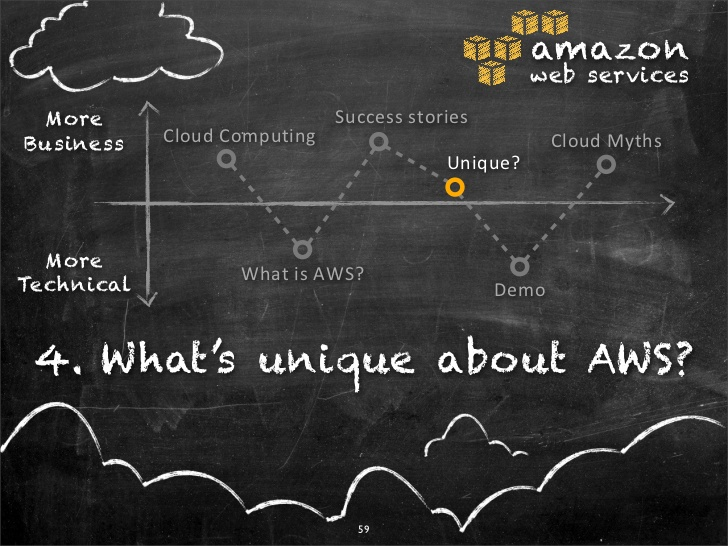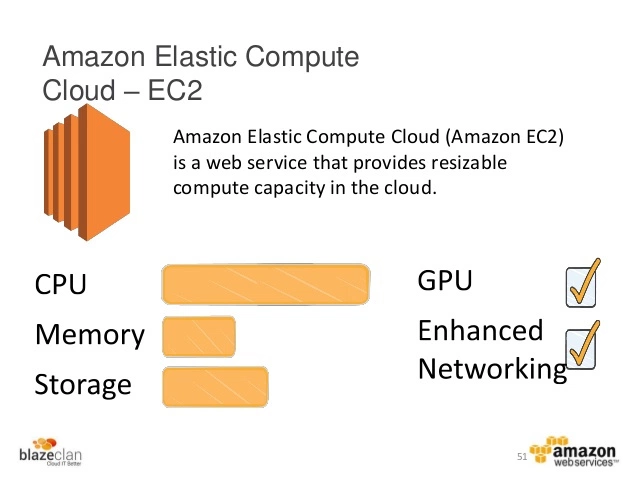
Amazon Web Services
- By Lucid Team
- 03 March 2023

What is Amazon Web Services ?
Amazon Web Services (AWS) is a collection of remote computing services (web services) that together make up a cloud computing platform, offered over the Internet by Amazon.com.
Website: http://aws.amazon.com
AWS is located in 9 geographical 'Regions‘. Each Region is wholly contained within a single country and all of its data and services stay within the designated Region.
Each Region has multiple 'Availability Zones', which are distinct data centers providing AWS services. Availability Zones are isolated from each other to prevent outages from spreading between Zones. However, Several services operate across Availability Zones (e.g. S3, DynamoDB).

What is AWS Offering?
Low Ongoing Cost:, pay-as-you-go pricing with no up-front expenses or long-term commitments.
Instant Elasticity & Flexible Capacity: (scaling up and down) Eliminate guessing on your infrastructure capacity needs.
Speed & Agility: Develop and deploy applications faster Instead of waiting weeks or months for hardware to arrive and get installed.
Apps not Ops: Focus on projects. Lets you shift resources away from data center investments and operations and move them to innovative new projects.
Global Reach: Take your apps global in minutes.
Open and Flexible: You choose the development platform or programming model that makes the most sense for your business.
Secure: Allows your application to take advantage of the multiple layers of operational and physical security in the AWS data centers to ensure the integrity and safety of your data.

Amazon Elastic Compute Cloud (EC2)
A web service that provides resized compute capacity in the cloud.
EC2 allows creating Virtual Machines (VM) on-demand. Pre-configured template Amazon Machine Image (AMI) can be used get running immediately. Creating and sharing your own AMI is also possible via the AWS Marketplace.
Auto Scaling allows automatically scale of the capacity up seamlessly during demand spikes to maintain performance, and scales down during demand lulls to minimise costs.
Elastic Load Balancing automatically distributes incoming application traffic across multiple Amazon EC2 instances.
Provide tools to build failure resilient applications by launching application instances in separate Availability Zones.
Pay only for resources actually consume, instance-hours.
VM Import/Export enables you to easily import virtual machine images from your existing environment to Amazon EC2 instances and export them back at any time.

EC2 Instances
Micro instances (t1.micro):
Micro Instance 613 MiB of memory, up to 2 ECUs (for short periodic bursts), EBS storage only, 32-bit or 64-bit platform.
Standard Instances provide customers with a balanced set of resources and a low cost platform.
M1 Small Instance (Default) 1.7 GiB of memory, 1 EC2 Compute Unit (1 virtual core with 1 EC2 Compute Unit), 160 GB of local instance storage, 32-bit or 64-bit platform
M1 Medium Instance 3.75 GiB of memory, 2 EC2 Compute Units (1 virtual core with 2 EC2 Compute Units each), 410 GB of local instance storage, 32-bit or 64-bit platform
M1 Large Instance 7.5 GiB of memory, 4 EC2 Compute Units (2 virtual cores with 2 EC2 Compute Units each), 850 GB of local instance storage, 64-bit platform
M3 Double Extra Large Instance 30 GiB of memory, 26 EC2 Compute Units (8 virtual cores with 3.25 EC2 Compute Units each), EBS storage only, 64-bit
Amazon Elastic Block Store (EBS)
Provides block level storage volumes (1 GB to 1 TB ) for use with Amazon EC2 instances.
Multiple volumes can be mounted to the same instance.
EBS volumes are network-attached, and persist independently from the life of an instance.
Storage volumes behave like raw, unformatted block devices, allowing users to create a file system on top of Amazon EBS volumes, or use them in any other way you would use a block device (like a hard drive).
EBS volumes are placed in a specific Availability Zone, and can then be attached to instances also in that same Availability Zone.
Each storage volume is automatically replicated within the same Availability Zone.
EBS provides the ability to create point-in-time snapshots of volumes, which are persisted to Amazon S3.
These snapshots can be used as the starting point for new Amazon EBS volumes, and protect data for long-term durability.
The same snapshot can be used to instantiate as many volumes as you wish.
These snapshots can be copied across AWS regions.
Amazon Simple Storage Service (S3)
Amazon S3 provides a simple web services interface that can be used to store and retrieve any amount of data, at any time, from anywhere on the web.
Write, read, and delete objects containing from 1 byte to 5 terabytes of data each. The number of objects you can store is unlimited.
Each object is stored in a bucket and retrieved via a unique, developer-assigned key.
A bucket can be stored in one of several Regions.
You can choose a Region to optimize for latency, minimize costs, or address regulatory requirements.
Objects stored in a Region never leave the Region unless you transfer them out.
Authentication mechanisms are provided to ensure that data is kept secure from unauthorized access.
Objects can be made private or public, and rights can be granted to specific users.
S3 charges based on per GB-month AND per I/O requests AND per data modification requests.
Amazon Virtual Private Cloud (VPC)
Amazon VPC lets you provision a logically isolated section of the Amazon Web Services (AWS) Cloud.
You have complete control over your virtual networking environment, including:
selection of your own IP address range,
creation of subnets, and
configuration of route tables and network gateways.
VPC allows bridging with an onsite IT infrastructure with an encrypted VPN connection with an extra charge per VPN Connection-hour.
There is no additional charge for using Amazon Virtual Private Cloud, aside from the normal Amazon EC2 usage charges.
Amazon Relational Database Service (RDS)
Amazon RDS is a web service that makes it easy to set up, operate, and scale a relational database in the cloud.
Amazon RDS gives access to the capabilities of a familiar MySQL, Oracle or Microsoft SQL Server database engine.
Code, applications, and tools already used with existing databases can be used with RDS.
Amazon RDS automatically patches the database software and backs up the database, storing the backups for a user-defined retention period and enabling point-in-time recovery.
Amazon RDS provides scaling the compute resources or storage capacity associated with the Database Instance.
Pay only for the resources actually consumed, based on the DB Instance hours consumed, database storage, backup storage, and data transfer.
On-Demand DB Instances let you pay for compute capacity by the hour with no long-term commitments.
Reserved DB Instances give the option to make a low, one-time payment for each DB Instance and in turn receive a significant discount on the hourly usage charge for that DB Instance.
SQL Databases
In relational databases (SQL Databases), ACID (Atomicity, Consistency, Isolation, Durability) is a set of properties that guarantee that database transactions are processed reliably.
Atomicity requires that each transaction is "all or nothing": if one part of the transaction fails, the entire transaction fails, and the database state is left unchanged.
The consistency property ensures that any transaction will bring the database from one valid state to another.
The isolation property ensures that the concurrent execution of transactions results in a system state that would be obtained if transactions were executed serially,.
Durability means that once a transaction has been committed, it will remain so, even in the event of power loss, crashes, or errors.
Amazon DynamoDB
DynamoDB is a fast, fully managed NoSQL database service that makes it simple and cost-effective to store and retrieve any amount of data, and serve any level of request traffic.
All data items are stored on Solid State Drives (SSDs), and are replicated across 3 Availability Zones for high availability and durability.
DynamoDB tables do not have fixed scheme, and each item may have a different number of attributes.
DynamoDB has no upfront costs and implements a pay as you go plan as a. a flat hourly rate based on the capacity reserved.
NoSQL Databases
A NoSQL database provides a mechanism for storage and retrieval of data that employs less constrained consistency models than traditional relational databases.
NoSQL databases only support Eventual Consistency which is a consistency model used in distributed computing that informally guarantees that, if no new updates are made to a given data item, eventually all accesses to that item will return the last updated value.
NoSQL databases are often highly optimized key–value stores intended for simple retrieval and appending operations, with the goal being significant performance benefits in terms of latency and throughput.
Key–value stores allow the application to store its data in a schema-less way.
The data could be stored in a datatype of a programming language or an object. Because of this, there is no need for a fixed data model.
Amazon CloudWatch
Amazon CloudWatch provides monitoring for AWS cloud resources and the applications customers run on AWS.
Amazon CloudWatch lets you programmatically retrieve your monitoring data, view graphs, and set alarms to help you troubleshoot, spot trends, and take automated action based on the state of your cloud environment.
Amazon CloudWatch enables you to monitor your AWS resources up-to-the-minute in real-time, including:
Amazon EC2 instances,
Amazon EBS volumes,
Elastic Load Balancers,
Amazon RDS DB instances.
Metrics such as CPU utilization, latency, and request counts are provided automatically for these AWS resources.
Customers can also supply their own custom application and system metrics, such as memory usage, transaction volumes, or error rates,.
Build Business Solution for AWS with us :
Lucid Solutions offers reliable, scalable, and inexpensive cloud computing and have most talented , skilled developers and designers who offer the most artistic designs & provide the most secure and effective solutions for your business.
We use Amazon web hosting services to provide a comprehensive and complete web solution for all your business needs.
Lucid Solutions has Accelerate business transformation with cloud industry leaders. We Bring Shadow IT into the corporate IT mainstream.
Lucid Solutions follow organised and systematic processes, best practices, and years of experience to offer Amazon web hosting services.